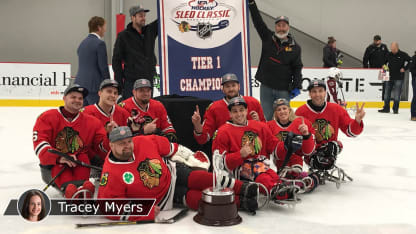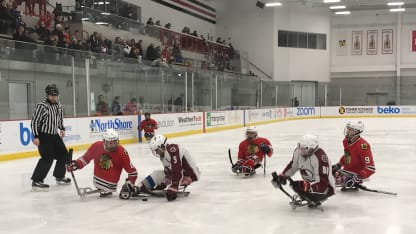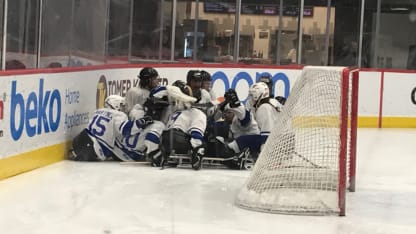But more than winning, the classic, which began with four teams in 2010 and has grown to 31 this year, has been about opportunity and camaraderie, embodying the Hockey is for Everyone initiative. USA Hockey Disabled Section chair J.J. O'Connor said this year's event was "fantastic."
"The players all played hard, I saw a lot of smiles on people's faces and there was a lot of hard hitting and competitiveness," said O'Connor, the namesake for the O'Connor Courage Trophy, awarded to the Tier I champion. "It was a hockey tournament, just as it should be."
Erika Mitchell, a defenseman for the Blackhawks Tier I team, has played in the classic since its inception. The Chicago native has played sled hockey for 23 years and is amazed by its growth.
"I think there were 20 teams when I first started. Now at our nationals last year, we had about 90-something teams there," said Mitchell, 31, who has caudal regression syndrome, in which the bones in the lower spine are usually missing or misshapen. "That's exciting, just to see the sport grow."
Many players talked of the positives sled hockey has brought them. Ben Maenza, 30, is a defenseman for the Predators Tier II team. A native of Brentwood, Tennessee, he lost both of his legs when an improvised explosive device (IED) was triggered in Afghanistan on Oct. 21, 2010. He originally tried wheelchair basketball but didn't love it. Sled hockey was a different story.
"Hockey saves lives. It's for real," said Maenza, who's been playing for four years. "For me, personally, overcoming injuries, you can get down. I hear people who would get stuck on the couch, being sad at home. Getting out here, building the team camaraderie, exercise, getting aggression out. You can get all kinds of stuff from sled hockey, and that's why I love it. And our team, man, they're my brothers."





